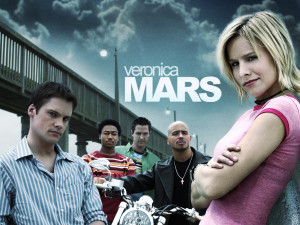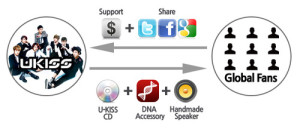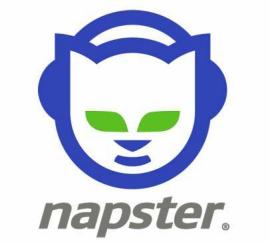 Earlier this week, U-Kiss became surrounded with controversy when they posted an announcement of the start of a crowdfunding project for their next album. They said that they wanted a chance to give back the love they’d received and had found a way to open communication with fans. Some of the rewards for giving money included an autographed album, a ceramic speaker, and notably, “DNA accessories.” In case you missed it, please read about the rest in Leslie’s in-depth article for a larger perspective and background on the issue.
Earlier this week, U-Kiss became surrounded with controversy when they posted an announcement of the start of a crowdfunding project for their next album. They said that they wanted a chance to give back the love they’d received and had found a way to open communication with fans. Some of the rewards for giving money included an autographed album, a ceramic speaker, and notably, “DNA accessories.” In case you missed it, please read about the rest in Leslie’s in-depth article for a larger perspective and background on the issue.
This raises the question: Is the use of crowdfunding ethical? For whom? And of course, does crowdfunding have a place in K-pop?
Sahar: I may be biased because I have friends (who are not even close to being rich people) who worked on the Veronica Mars project and were very involved in getting that Kickstarter going and working on the film, but I think that one of the challenges that genuinely creative people in Hollywood face is that it’s hard to get studios to fund a film that isn’t obviously going to make a lot of money. Hence, all of the big budget blockbuster films that are maybe not very thoughtful but have broad appeal. Veronica Mars struggled as a show even, so I can see why executives were not crazy about handing out money for a film. I do know that they did shop the film around for a while before it became clear that Hollywood was not going to fund it on its own.
 That said, I’m not sure I would compare a renegade show like Veronica Mars, or a thinking person’s film like whatever Zach Braff will inevitably make, with K-pop, which unlike those films, is generally intended to appeal to a broad audience. But, even though I am suspicious of that comparison, I think that people spend their money on what they want. How is giving to the Veronica Mars project different from spending money to pre-order a physical copy of G-Dragon‘s latest album, which 300,000 people in Korea did? It gives consumers a vote on the project, and in that sense it is more broadly democratic. Projects that a large number of people don’t believe in won’t happen, while projects that may not appeal to people with lots of money may still get green lit if enough people pool their resources together. And if artists don’t do what they were asked, then they will never get donations again. It’s self regulating in that sense.
That said, I’m not sure I would compare a renegade show like Veronica Mars, or a thinking person’s film like whatever Zach Braff will inevitably make, with K-pop, which unlike those films, is generally intended to appeal to a broad audience. But, even though I am suspicious of that comparison, I think that people spend their money on what they want. How is giving to the Veronica Mars project different from spending money to pre-order a physical copy of G-Dragon‘s latest album, which 300,000 people in Korea did? It gives consumers a vote on the project, and in that sense it is more broadly democratic. Projects that a large number of people don’t believe in won’t happen, while projects that may not appeal to people with lots of money may still get green lit if enough people pool their resources together. And if artists don’t do what they were asked, then they will never get donations again. It’s self regulating in that sense.
Here in the US, it’s very common for musicians who are not on big labels or who are on struggling labels to crowdfund their album. Vienna Teng recently did it, and I saw absolutely nothing wrong with this. Actually, my best friend is doing it right now to raise funds to publish her first graphic novel (which is going to be awesome, by the way) because it’s very hard to get published, and there’s no way, even if I split the cost with her, that we could afford to make it happen on our own. And if people don’t want to contribute, they don’t have to. Not forcing people to contribute seems like a highly ethical approach. By comparison, think about how often sports teams have their stadiums subsidized by local government authorities, in effect forcing individuals to contribute through their taxes, even if they never attend any events at the stadium.
In the context of this discussion, it seems highly relevant that the Hallyu wave is heavily subsidized by the Korean government. If U-Kiss and Odd Eye fans want to contribute, who are we to tell them that it’s unethical for them to even be asked to? It’s not terribly different from buying a concert ticket.
 Jaclyn: Overall, I don’t see crowdfunding as ethical. It’s basically asking for money. People will offer goodies, but what worth is that when you’re giving away a hundred bucks? So people pay money for a movie where they get no reward besides the movie itself, which they will eventually have to pay for. In regards to the Veronica Mars movie and Zach Braff film, these people don’t need the money. Zach Braff’s net worth is 22 million dollars. It is the consumers money and it is their choice if they wish to give, but the return investment is normally never worth it and information is normally limited. There are many stories of failure to deliver on products or inventions. These projects are either too risky or too small, and it begs to wonder why can’t these projects try to find real investors.
Jaclyn: Overall, I don’t see crowdfunding as ethical. It’s basically asking for money. People will offer goodies, but what worth is that when you’re giving away a hundred bucks? So people pay money for a movie where they get no reward besides the movie itself, which they will eventually have to pay for. In regards to the Veronica Mars movie and Zach Braff film, these people don’t need the money. Zach Braff’s net worth is 22 million dollars. It is the consumers money and it is their choice if they wish to give, but the return investment is normally never worth it and information is normally limited. There are many stories of failure to deliver on products or inventions. These projects are either too risky or too small, and it begs to wonder why can’t these projects try to find real investors.
Crowdfunding should have no place in K-pop. There are some smaller arguments against it, but the one and only real important issue is that the K-pop demographic is mostly made up of middle-schoolers and teenagers. This is pretty specific to K-pop and is so important as to whether crowdfunding should be in K-pop. The answer is no, just no.
Laverne: I’m torn about crowdfunding. On one hand, it helps the little guy – aspiring artists, entrepreneurs, grassroots organizations, etc. On the other hand, larger entities such as NH Media or Zach Braff can utilize it unnecessarily. I have a personal problem with these large entities basically double-profiting off of fans. Not only does their work get paid for but they can then charge those same fans again once the work is completed.
But while this leaves a bad taste in my mouth, I don’t think it is unethical. Fans freely choose to donate and can even receive items in return (though the monetary value does not equal the compensation value).
For me, the issue is more of a moral question. I personally don’t think a company should crowdfund as a means to produce music. As Leslie said in her article, U-Kiss’ next album is likely to be produced regardless of if the crowdfunding campaign happens or not. So this comes off as a money-grabbing scheme to me. In contrast, I would support an independent artist who is trying to produce an album but has no company.
 And don’t even get me started on the whole member DNA thing. It’s almost worse than Odd Eye allowing fans of a certain tier to have dinner with them because of the creep factor. I say almost because both feel like these companies are, essentially, whoring out the members, although Odd Eye’s is kind of like a personal fan meet.
And don’t even get me started on the whole member DNA thing. It’s almost worse than Odd Eye allowing fans of a certain tier to have dinner with them because of the creep factor. I say almost because both feel like these companies are, essentially, whoring out the members, although Odd Eye’s is kind of like a personal fan meet.
Ugh. K-pop, please stay away from crowdfunding. Please?
Shweta: I think that the crowdfunding ethical concerns have more to do with how it’s carried out as opposed to the concept of crowdfunding itself. The largest crowdfunding projects in the world are for a profitable business just like NH Media, but technologically oriented–the Ubuntu Smartphone and the Pebble smartwatch, both of which raised a whopping 10 million dollars apiece. Despite the huge sums of money involved, I don’t think there were a lot of people who felt the “moral flag” go off with these projects. So what makes these pop culture related endeavors different, and us bystanders feel queasy?
So rather than worrying how big or small a company is, our ambivalence should really be about the lack of financial transparency and the proper compensation for those “donations.” In that context, what NH Media is offering for their crowdfunding project undoubtedly leaves me in an uncomfortable position, as it fails in both counts. What is most notably wrong is that none of the tiers involve anyone getting the actual CD being funded via the fundraising campaign. This is really strange in the context of how Kickstarter-type projects operate. You fund money for the project upfront, then you get the product of the project in the backend. I guess I could call it a sort of donation-cum-purchase order. But debating all of this is irrelevant right now since U-kiss provides neither transparency nor proper compensation, and thus the concept of educated, grassroots investments disappears, which defeats the central aspect of crowdfunding. Instead, it’s now a way to exploit naive and devoted fans’ affections for their idol, and that is a dangerous thing.
Basically, I’m cool with using crowdfunding in K-pop or any ethical project for that matter. People have the right to invest in whatever they desire. What I’m not cool with is how crowdfunding is currently being handled in K-pop–which is exceptionally poorly. Like Laverne said, there’s definitely a creep factor involved with both the Odd Eye and U-kiss crowdsourcing ventures. Idol DNA? Are they being serious right now?
Pat: I find crowdfunding to be another form of fundraising — it is basically the giving of money voluntarily. So it’s really up to fans if they are willing or not and it’s not anyone else’s place to judge them since it’s their investment to make.
That being said, I agree with Shweta. When it comes to crowdfunding, everything depends on the way it is carried out. And in the case of NH Media, it just leaves an unsavory taste. You don’t get an actual album until you donate the equivalent of 75 dollars when you can order a signed album for 20 dollars elsewhere. And I don’t even want to start on the crassness of those DNA accessories. It’s creepy and feeds into the mentality that idols are accountable to their fans.
I personally don’t want this to happen again. Crowdfunding and the money-hungry nature of K-pop companies? It’s a nightmare waiting to happen.
 Kelsey: I do support crowdfunding — it’s a very effective way to fund projects. The financial transparency that Shweta talked about, so that donors know exactly where their money is going, is extremely important and should be considered standard practice with these campaigns. K-pop isn’t exactly an industry with a lot of transparency, so I can’t imagine that NH Media will provide that degree of accountability.
Kelsey: I do support crowdfunding — it’s a very effective way to fund projects. The financial transparency that Shweta talked about, so that donors know exactly where their money is going, is extremely important and should be considered standard practice with these campaigns. K-pop isn’t exactly an industry with a lot of transparency, so I can’t imagine that NH Media will provide that degree of accountability.
It is a hard thing to say that certain people can crowdfund and certain people can’t. In the case of Veronica Mars, Warner Brothers as a business did need to know if the movie had a receptive market that would make it a success. What resulted was of course unprecedented, but I would still feel uncomfortable if Veronica Mars‘ success in the crowdfunding field led to huge waves of projects like it. I understand that the entertainment industry has a lot of constraints, and sometimes you have to get creative to find support for your projects, but I’m not convinced that crowdfunding should be used just because it’s an available option when someone has the capacity to find enough resources to do it on their own.
My problem with the U-Kiss campaign is that there’s a lot of exploitation of fans and the members going on here. The DNA thing is beyond creepy and uncomfortable, and there seems to be manipulation from NH Media by suggesting that U-Kiss won’t get another album if fans don’t fund it. At the same time, it is very difficult because there are a lot of details that aren’t available. If SM tried a Kickstarter campaign, it would get a lot of side-eyes because we have concrete facts about their revenue and status. With NH Media, those facts aren’t really on the table, so I can’t give them the benefit of the doubt nor complete criticism.
But as a bigger picture, K-pop demands too much from the fan-idol relationship for me to feel comfortable saying crowdfunding would be a good thing for the industry. Fans already buy idols extravagant gifts and buy multiple albums to increase chart positions and show loyalty. Crowdfunding would pump a lot of money into the K-pop companies, and because of the lack of transparency there, we’d probably never know what happens to fans’ donations, let alone whether it’s actually helping what fans thought they were supporting. Crowdfunding only strengthens the sometimes toxic relationship between fans, idols, and companies. Maybe it’s a bit pessimistic, but until I see otherwise, I don’t think fundraising like this has a place in K-pop that’s anything but dangerous.
Ambika: I think I took the DNA accessories aspect to be way less creepier than the rest of you. I thought it would be more accessories, like necklaces or rings, that have come in physical contact with the idols, maybe obvious stage jewelry. I don’t think anyone would actually offer to send something as literal as hair or blood, but if that was actually the case, I have no words. On that note, I don’t have a problem with crowdfunding. As others have mentioned, giving money is entirely optional. I don’t see this as being much different from paying high prices for personalized merchandise, contributing to fan projects, or buying things gifts for your idols. It’s all voluntary, and if there are people willing to spend the money to contribute, that’s their choice.
 As the website still doesn’t seem to be up yet, it’s doubtful that this is U-Kiss’ last ditch effort for an album. It may have been just a way to get feelers out for how many dedicated fans the group has. Regardless, the endeavor doesn’t seem to have been handled professionally, and the large break in the upkeep seems to imply that the situation won’t be straightened out anytime soon.
As the website still doesn’t seem to be up yet, it’s doubtful that this is U-Kiss’ last ditch effort for an album. It may have been just a way to get feelers out for how many dedicated fans the group has. Regardless, the endeavor doesn’t seem to have been handled professionally, and the large break in the upkeep seems to imply that the situation won’t be straightened out anytime soon.
Erika: Is anyone else surprised by what appears to be NH Media’s comfort with, basically, an admission of serious decline? In an industry so obsessed with presentation, it almost seems counter-intuitive that crowdfunding would have a place in K-pop. Maybe the company has confirmed the situation, but I smell shenanigans lurking in the bushes.
I do feel a tinge of alarm when I think of the idea that with crowdfunding, consumers not only have to pay for goods, but also their production. Yet, aren’t production costs reflected in the selling price of goods anyhow? Is crowdfunding really that novel, or just the awareness that we’re paying for far more than what’s presented upfront?
I’m comfortable with waiting and seeing what becomes of the crowdfunding efforts of U-KISS and Odd Eye before I formulate my final opinion on the matter.
Mark: On an ethics scale of 1 to 10 — 10 being completely against crowdfunding for even the humblest of causes, and 1 being perfectly fine with allowing mega-conglomerate corporations to crowdfund — I would say I’m a 1.5.
 I find that this discussion is a product of the changing times. With the growing inter-connectivity of an evermore globalizing world, crowdfunding will remain relevant and prominent as long as it remains legal. That is, human beings will resort to it as a convenient means of generating revenue for specialized causes as long as it is simply that — convenient. This reminds me of the debates over the ethics of pirating music when Napster came into being well over a decade ago, and debates over the legality of the recording and copying feature of newly commercialized VCRs nearly a decade before that. Even with all the litigation efforts at trying to discourage file-sharing (which still persists today), it didn’t prevent most people with a dial-up internet connection from illegally downloading their favorite songs, and it forced the music industry to adapt.
I find that this discussion is a product of the changing times. With the growing inter-connectivity of an evermore globalizing world, crowdfunding will remain relevant and prominent as long as it remains legal. That is, human beings will resort to it as a convenient means of generating revenue for specialized causes as long as it is simply that — convenient. This reminds me of the debates over the ethics of pirating music when Napster came into being well over a decade ago, and debates over the legality of the recording and copying feature of newly commercialized VCRs nearly a decade before that. Even with all the litigation efforts at trying to discourage file-sharing (which still persists today), it didn’t prevent most people with a dial-up internet connection from illegally downloading their favorite songs, and it forced the music industry to adapt.
We’ve opened up a Pandora’s Box that can’t be closed, and instead of debating over whether or not we think people should be allowed to crowdfund, we should come to terms with the fact that people are going to do it whether or not we want them to or not. The thing we should determine is how industries will take advantage of this new socio-economic tool and attempt to put it to good use.
Crowdfunding is fully ethical because, like most of you mentioned, it is completely out of the donors’ volition. The reason I give it a 1.5 and not a 1 is due to what Kelsey and Ambika mentioned of non-transparency and recipients not following through on their promises. As pertaining to K-pop, non-transparency and false promises are already two staple characteristics of the industry so those who support K-pop crowdfunding should know exactly what they are getting into.
What number do you give yourself on the crowdfunding ethics scale, readers?
(The Atlantic Wire, The New York Times, ucanfunding, Images via NH Media, Warner Brothers, Napster, NBC, The CW)


